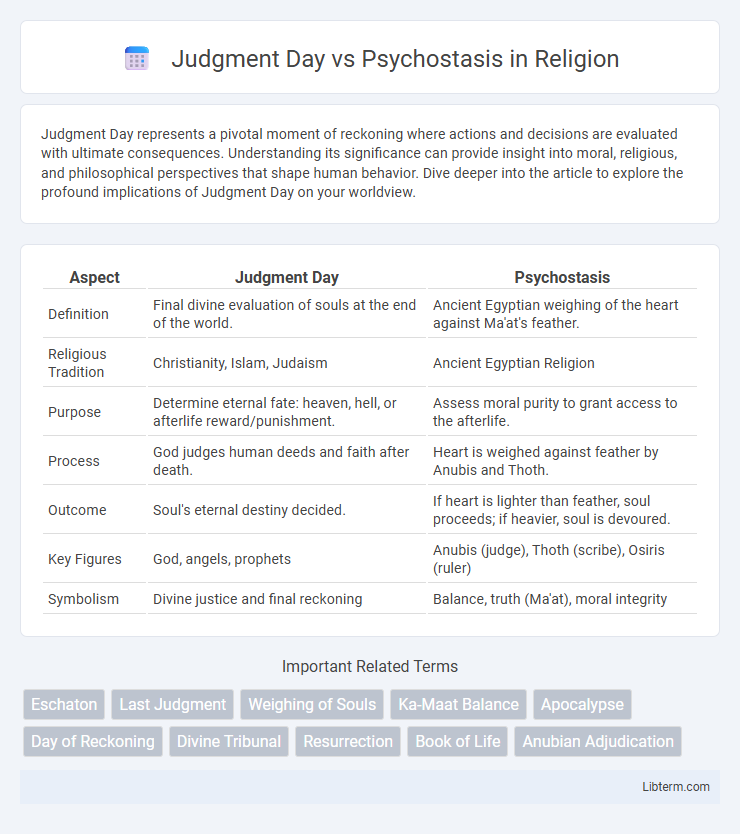Judgment Day represents a pivotal moment of reckoning where actions and decisions are evaluated with ultimate consequences. Understanding its significance can provide insight into moral, religious, and philosophical perspectives that shape human behavior. Dive deeper into the article to explore the profound implications of Judgment Day on your worldview.
Table of Comparison
| Aspect | Judgment Day | Psychostasis |
|---|---|---|
| Definition | Final divine evaluation of souls at the end of the world. | Ancient Egyptian weighing of the heart against Ma'at's feather. |
| Religious Tradition | Christianity, Islam, Judaism | Ancient Egyptian Religion |
| Purpose | Determine eternal fate: heaven, hell, or afterlife reward/punishment. | Assess moral purity to grant access to the afterlife. |
| Process | God judges human deeds and faith after death. | Heart is weighed against feather by Anubis and Thoth. |
| Outcome | Soul's eternal destiny decided. | If heart is lighter than feather, soul proceeds; if heavier, soul is devoured. |
| Key Figures | God, angels, prophets | Anubis (judge), Thoth (scribe), Osiris (ruler) |
| Symbolism | Divine justice and final reckoning | Balance, truth (Ma'at), moral integrity |
Introduction to Judgment Day and Psychostasis
Judgment Day refers to the eschatological event where souls face divine evaluation, determining their eternal fate based on moral conduct. Psychostasis, rooted in ancient Egyptian mythology, describes the weighing of the heart against the feather of Ma'at to judge a soul's purity and righteousness. Both concepts emphasize a post-mortem assessment integral to many religious beliefs and ethical systems, underscoring accountability in the afterlife.
Historical Origins of Judgment Day
Judgment Day, rooted in Abrahamic religions, originates from ancient Judaic teachings emphasizing divine justice and accountability after death. The concept evolved through biblical texts such as Daniel 12:2 and the Book of Revelation, illustrating an apocalyptic final judgment by God. In contrast, Psychostasis derives from ancient Egyptian mythology, representing the weighing of the soul against Ma'at's feather to determine moral righteousness before the afterlife.
Ancient Concepts of Psychostasis
Ancient concepts of Psychostasis involve the weighing of the soul's deeds on a scale to determine moral righteousness, a practice prominently featured in Egyptian mythology where the heart is balanced against the feather of Ma'at. Judgment Day in various traditions similarly emphasizes a final divine evaluation, but Psychostasis specifically highlights the ethical assessment of one's life through symbolic measurement. This ritual reflects the ancient worldview linking cosmic order and justice, reinforcing the soul's fate based on its earthly actions.
Key Differences Between Judgment Day and Psychostasis
Judgment Day involves the final evaluation of souls based on moral conduct, determining their fate in afterlife realms such as heaven or hell. Psychostasis, in contrast, specifically refers to the weighing of the soul's heart against the feather of Ma'at in ancient Egyptian belief, symbolizing truth and justice. The key difference lies in Judgment Day's broader eschatological scope versus Psychostasis' focused ritualistic symbolism in assessing purity and balance.
Symbolism in Judgment Day Narratives
Judgment Day narratives symbolize the ultimate moral reckoning where souls are evaluated based on their earthly deeds, reflecting themes of justice, retribution, and divine authority. Psychostasis, often depicted as the weighing of the soul, represents the balance between good and evil deeds, emphasizing spiritual accountability and moral equilibrium. This symbolism highlights the transformative journey of the soul, reinforcing the concept of cosmic order and the consequences of human choices.
The Role of Psychostasis in Ancient Religions
Psychostasis, the ancient ritual of weighing the soul, played a critical role in Egyptian religion by determining the moral righteousness of a deceased individual against the feather of Ma'at, symbolizing truth and justice. This process directly influenced the soul's fate in the afterlife, distinguishing it from the broader and often more apocalyptic concept of Judgment Day found in Abrahamic faiths. Psychostasis embodied a specific judgment mechanism emphasizing ethical balance and cosmic order, reflecting ancient beliefs about morality and spiritual consequences.
Modern Interpretations of Judgment Day
Modern interpretations of Judgment Day emphasize a symbolic awakening or reckoning rather than a literal apocalyptic event, often depicting it as an individual's moral or spiritual assessment. Psychostasis, rooted in ancient Egyptian mythology, represents the weighing of the soul against the feather of Ma'at, symbolizing truth and justice in the afterlife. Contemporary perspectives blend these concepts to explore themes of ethical balance, personal accountability, and transformative judgment beyond traditional eschatological views.
Comparative Analysis: Judgment Day vs Psychostasis
Judgment Day and Psychostasis both revolve around the evaluation of souls but differ significantly in cultural context and symbolism. Judgment Day, primarily rooted in Abrahamic religions, signifies the final divine assessment where souls face eternal reward or punishment based on earthly deeds. Psychostasis, originating from ancient Egyptian belief, represents the weighing of the heart against the feather of Ma'at to determine a soul's purity and eligibility for the afterlife, emphasizing moral balance rather than binary judgment.
Cultural Impact of Judgment Day and Psychostasis
Judgment Day, deeply embedded in Christian eschatology, profoundly influences Western art, literature, and cinema by symbolizing final reckoning and moral accountability. Psychostasis, originating from ancient Egyptian beliefs about the weighing of the soul, shapes cultural understandings of justice and afterlife through rituals and iconography seen in artifacts like the Book of the Dead. Both concepts underscore humanity's enduring fascination with judgment, morality, and the fate of the soul across diverse civilizations.
Conclusion: Relevance in Contemporary Beliefs
Judgment Day remains a pivotal concept in contemporary Abrahamic religions, symbolizing ultimate divine justice and moral accountability. Psychostasis, the ancient Egyptian belief in the weighing of the soul, continues to influence modern spiritual and esoteric interpretations of afterlife judgment and personal ethics. Both frameworks underscore humanity's enduring quest to understand moral consequence and the soul's fate beyond death.
Judgment Day Infographic

 libterm.com
libterm.com